TEAM WORK
In the heart of conservation: TMNP’s all-women team leads the charge against environmental crimes
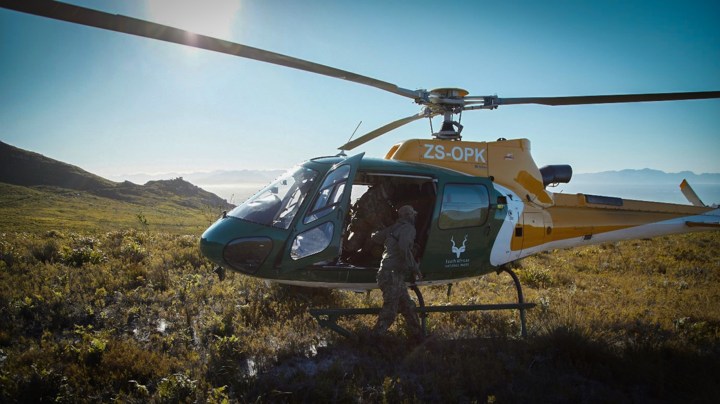
The success of TMNP’s conservation soldiers who target crime on Table Mountain hinges on the data collected and analysed by a group of women, who carry out their vital work quietly in the background. We talked to some of them
Daily Maverick ventured inside the Table Mountain National Parks (TMNP) operations centre where an all-women team is laying the groundwork for special operations targeting environmental crimes such as abalone poaching, bark stripping, and flower poaching accelerating biodiversity loss across the mountain – as well as crimes against visitors.
The all-women team specialises in data-driven operations, using information collected across a range of channels and turning it into actionable plans to intervene in environmental and contact crime conducted by poaching syndicates.
Jaclyn Smith, manager of the Sea Air and Mountain (SEAM) Operations Unit, said: “The unit consists of two components. One is our operations room – our information and communications hub for data that comes in across the landscape from technology, people, social media, shared information groups with security cluster partners like the City of Cape Town, South African Police Services and metro police, as well as unofficial channels like neighbourhood watches and the other partners around the park.
“The second component is the operators, which are our conservation soldiers that are specially trained to deal with target-driven operations where they take the information collected by the operations room and turn it into actionable plans to intervene with environmental and contact crime in the landscape.”
Smith manages the operations team, along with Ayesha Davids, the operations room control officer, who coordinates all activities relating to information management, interpretation and dissemination within the TMNP terrestrial and marine protected areas.
Davids leads a team of data capturers who monitor technology and information sources to coordinate communication and prepare actionable information for the SEAM team to act on.
For their safety, Daily Maverick cannot divulge their names or faces to the public, but here we share some of what the incredible women have been doing to safeguard the wildlife, biodiversity and visitors of TMNP.
The data capturers explained that their day-to-day activities and duties start with capturing data from various sources.
“We collect data; the data might be coming from WhatsApp or straight from our rangers, and then we capture it on the system … After that, we will extract the data, analyse it and make the data make sense. After analysing the data, we will come up with intelligence and do incident reports,” one said.
Inside the TMNP operations room
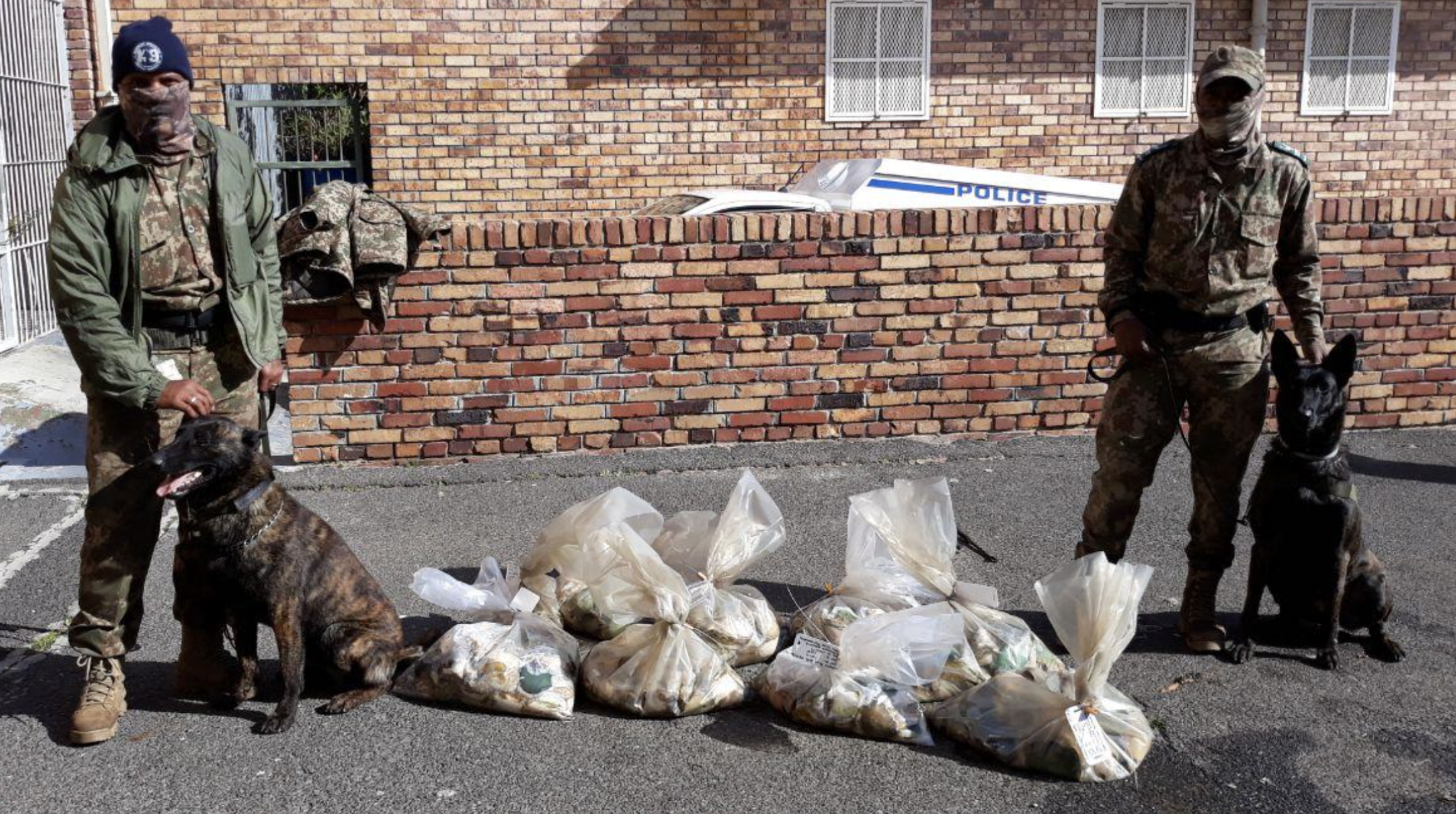
Sea, Air and Mountain operators and their canine helpers with a haul of abalone that was confiscated after a counter-poaching operation in a marine protected area. (Photo: TMNP)
Davids, who oversees the data capturing and vetting of information coming into the operations room, explained that they facilitated information gathering and converting that information into intelligence so that operators could fulfil their role and execute successful arrests in terms of counter-poaching, visitor safety and more.
“Over and above actual arrests and incidents, we have digitised all the information coming from the different sections in TMNP. That was a noteworthy experience because everything had been written by hand in occurrence books, in fines, in just physical documentation. The girls documented 10 years’ worth of information,
“With that information, you can imagine the amount of data that allows us to do large-scale analysis in terms of trends over longer periods,” she said.
Smith added that a lot of the time they worked with partners to combat marine crime in the park, such as abalone poaching, which was deeply rooted in broad syndicates across South Africa and globally.
“We plan our operations to prevent poaching from happening. We don’t want to broadcast pictures of abalone that we are busy counting at the police station after we’ve arrested poachers. By that stage, the animal is dead. We want to keep the animal alive in the water.
“We largely drive our operations toward preventing poachers from being able to drop off their divers and stop them from being able to enter the water completely,” she said.
Smith said terrestrial crimes included bark-stripping – the removal of bark from a mature tree in the national park, which could then be used in the illicit market for traditional medicine.
“We are aware that some people use bark in small amounts and they take it for subsistence use from various locations or purchase it legally through established channels.
“Then there’s the illicit trade where they indiscriminately remove bark from trees and it results in the death of that tree,” she said.
Read more in Daily Maverick: A conversation with the man who paints trees to combat bark stripping
According to Smith, the environmental impact of bark stripping is that entire stands of trees in a natural forest will leave pockets of desolation, where the role of that tree in that ecosystem has now been removed. This has knock-on effects on other parts of the environment.
The second type of terrestrial crime that the team deals with is the removal of proteas from the mountain.
“As we know, every part of an ecosystem has a role to play, the flower head of protea plants serves the purpose of ensuring the biodiversity and genetic viability of that population of species. It supports habitats for pollinators and for animals that live underneath the plant. So in removing it, you remove that species and its function from the ecosystem,” she said.
Proteas can be purchased, but Smith said it’s cheaper and easier to try and get it where it grows naturally, so a lot of people do it illegitimately.
“These flowers are taken from the park and sold on the streets. In various markets on the streets of Cape Town, you’ll see rows and rows of buckets of flower heads, chances are that could be illegal. I’m not saying all of them are, but a great deal of them can be illegal,” Smith said.
Smith said the intention with those sorts of crimes was to track where the crime was happening, keep a record and establish a trend line.
“If we see a repeat of that offence happening in the area, we can then say what are the commonalities of where that crime is taking place, and how best can we intervene to prevent that crime from happening,” she said.
If they do arrest someone as a result of an operation, they collect that information in a database and any time they click on a location, all of the information linked to that crime or to that location will come up as a history log – the person that was arrested, the CAS (Crime Administration System) number, and so on.
“It’s all about area integrity management, which is the key driver behind this – looking at the network of conservation estate, marine and terrestrial, and being able to secure it,” Smith said.
While it was quite a hard-line defence between crime and the protected area, Smith said it was a necessary tool to ensure the preservation of the landscape for future generations.
Significant successes
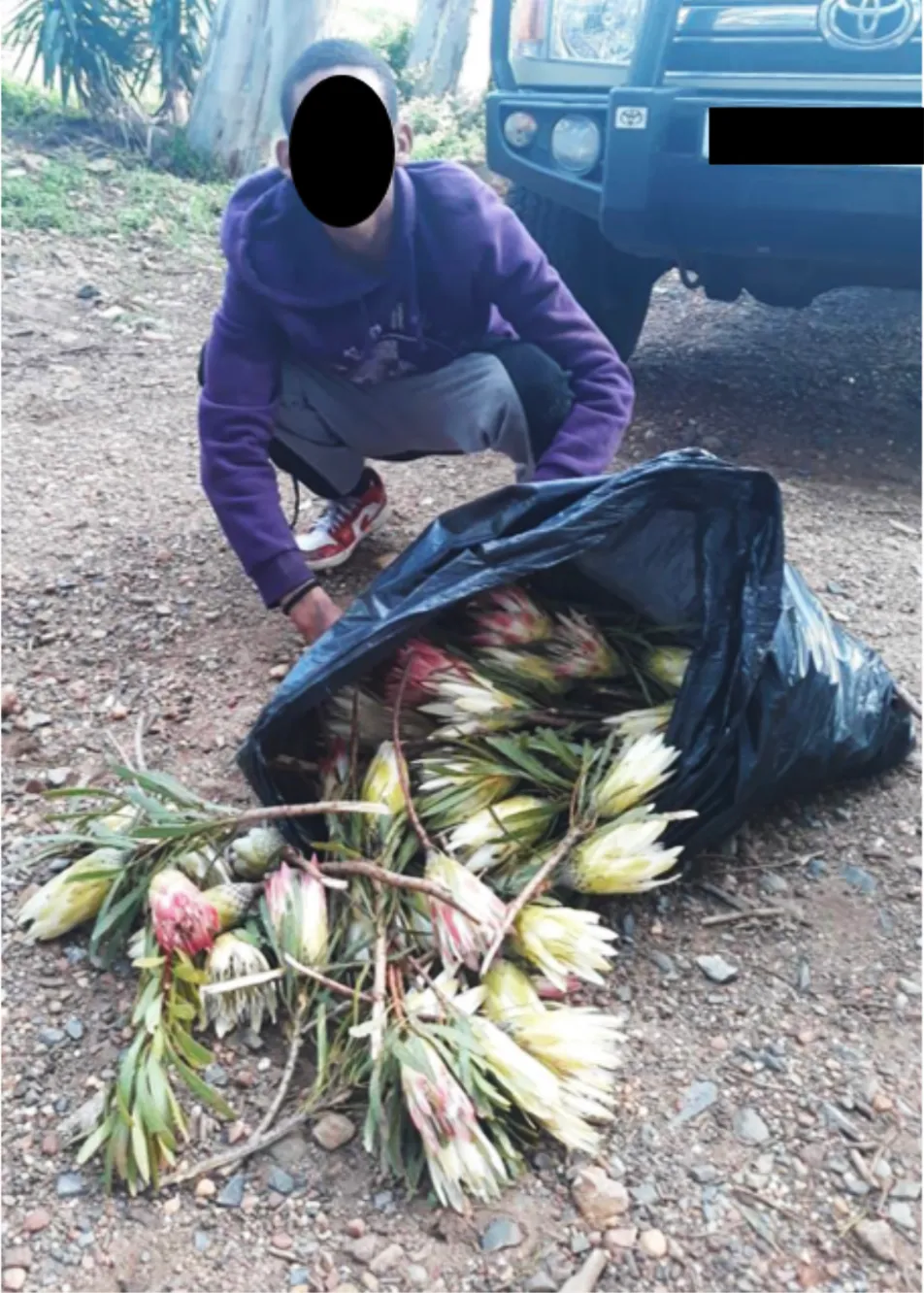
A suspect arrested in the Table Mountain National Park for illegally harvesting proteas. (Photo: Supplied)
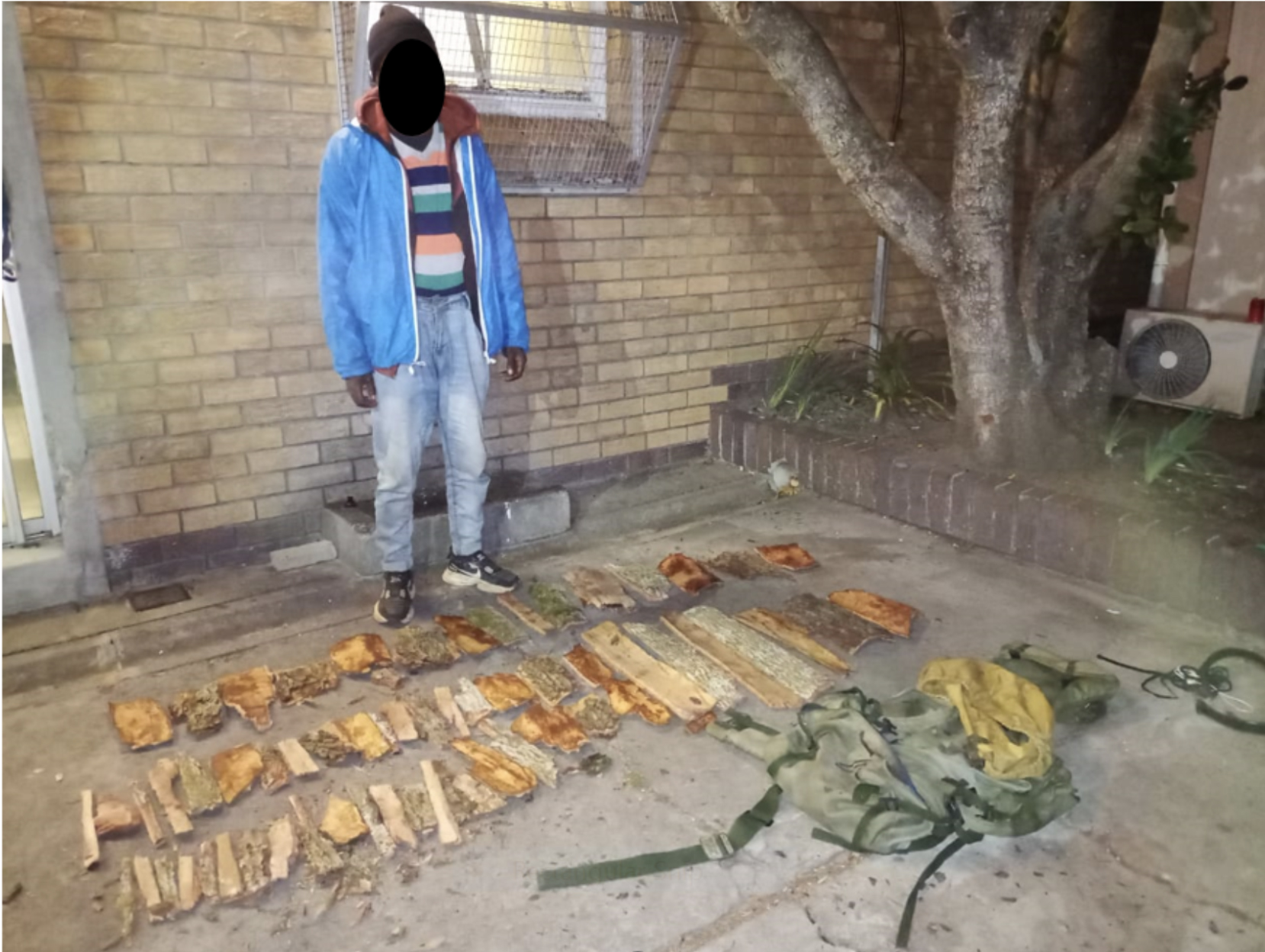
A suspect with tree bark harvested illegally from the Table Mountain National Park. (Photo: TMNP)
Almost a year ago, the work done by the operations team led to a successful operation by the SEAM Special Operations Rangers, which resulted in the arrest of three suspects caught in the act of stripping trees in Newlands Forest on 18 April 2023.
Smith said they conducted an extended operation when bark stripping was being reported every single day, with the help of community groups on social media and various stakeholder groups.
“What we ended up doing was what we call a waylay, an extended deployment. We had a team in various locations in a hotspot area known for the number of instances of bark stripping.
“They stayed put for about three days and on the third night, they heard the banging of an axe against a tree in the forest and they signalled to each other … They then gathered together, in a formation, and moved down towards where they heard the sound … They followed the sound without light, made their way to it and found a group of three men in the process of stripping trees with a little fire going.
“They ambushed them and arrested them. We ended up confiscating about 40kg of bark that had been stripped from a tree, so that was a huge success,” Smith said.
But to get to that point took daily information gathering and determining the best possible position to intervene or catch people in the act.
“So behind the scenes, there’s a lot that needs to be done to get and refine our resources to aim for a specific target. There were weeks of work that went into planning this operation, to get people in a location that would be most ideal,” she said.
Three suspects were arrested and charged in terms of the National Environmental Management: Protected Areas Act 57 of 2003, which governs all management of the terrestrial component of the national park.
With regards to arrests, Davids said another noteworthy case that they assisted with was the arrest of a man suspected of terrorising visitors on Lion’s Head and Signal Hill.
“In [December 2023], the incidents started spiking – not that this was not an unusual occurrence, robberies take place everywhere – but this was an interesting case where this suspect was coming in habitually on certain days and targeting specific times. With the help of the girls, we used all the information [trolling Facebook pages and Whatsapp groups with the help of different hiker groups, networks, social groups, runners, hikers, and cyclists] filtering into our operations room,
“Combining that and using the information, we set up a trend. We used the most likely times he would come in, and that enabled us to set up an operation to apprehend him, which we did after some time.
“The unfortunate thing was that we took some time to get that information, but at the end of the day, he was arrested and he went to court [the case is still running],” Davids said.
‘It is an ongoing battle’
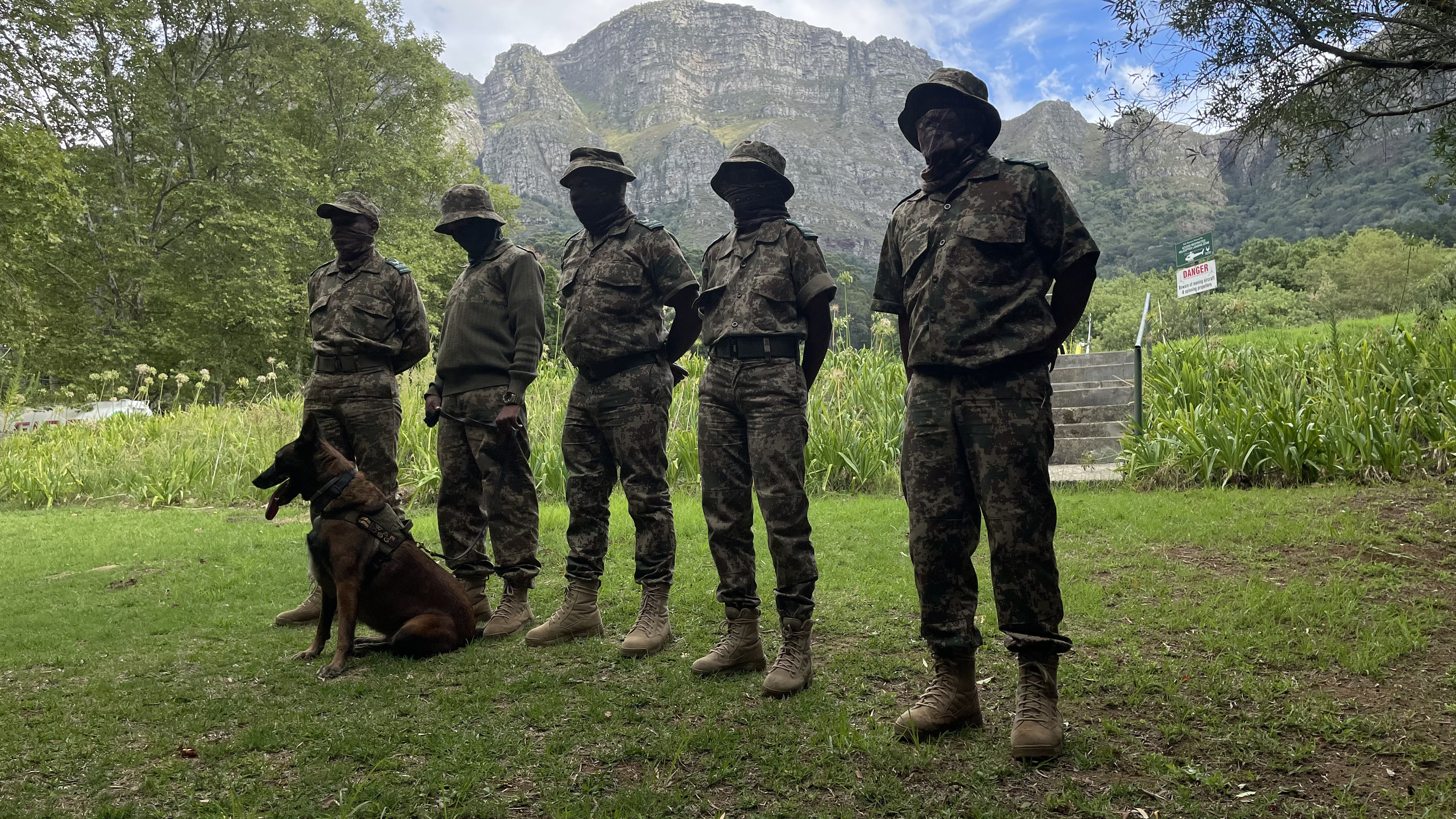
Table Mountain National Park’s Sea, Air and Mountain special operations rangers conduct targeted operations to combat environmental crime and ensure the safety of visitors in the park. (Photo: Kristin Engel)
Of the all-women operations centre team, TMNP park manager Megan Taplin said: “They do their work kind of undercover, but the information and the work that they do is vital to our success.
Taplin said just keeping ears to the ground to gather information helped, but it had to be acknowledged that they often fought against organised criminal syndicates that might be run from outside the country.
“It is an ongoing battle, and we don’t always have successes, But often, just by being out on patrols and having our ear to the ground, we’ll stop potential crimes from happening.
“We might disrupt abalone poachers so that they don’t actually get the abalone or they don’t get the abalone to sale, wherein we confiscate it. So it’s not always about actual arrests and successes, it’s also about disrupting the activities that are happening,” Taplin said.
She added that there were extremely diverse systems within the park, and it was important that they targeted these crimes threatening that biodiversity.
She said they were in the process of planning a bigger operations centre with more staff and more technology. DM




















 Become an Insider
Become an Insider
Education and not retribution is the solution. With a few exceptions most of these infractions are dictated by subsistence; sending these people to jail serves little if any purpose whilst the untouchable fat cats sit in parliament.